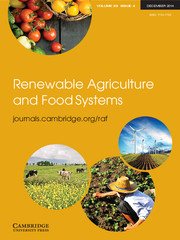Article contents
In the weeds: distinguishing organic farmers who want information about ecological weed management from those who need it
Published online by Cambridge University Press: 31 January 2018
Abstract
The benefits of farming organically in the USA are increasingly known; however, organic farmers also encounter considerable risks, especially from weeds. Without herbicides, organic farmers can rely only on crop rotations, mechanical cultivation, manual weeding, beneficial insects and other cultural practices, termed ecological weed management (EWM), to control weeds. Despite promising results and the many ways in which EWM can be employed, it remains poorly adopted by the organic community. Organic farmers resist research and recommendations from University scientists and Extension, instead preferring to rely on local family and friends and their own experience to guide decisions. Here we investigate factors that may lead organic farmers to recognize that they need additional information about EWM and to seek that information out. Using a national survey of organic farmers (n = 554) and a risk-information seeking and processing model, we show that farmers’ risk and benefit perceptions, worry, social norms encouraging seeking out information, and farmers’ own perceived knowledge gaps, particularly with respect to their most problematic weed, influence information-seeking behavior. Identifying characteristics that may distinguish those organic farmers who need and want additional information, we provide recommendations to Extension and University scientists about how best to communicate, build trust and provide decision support to the organic community with respect to EWM.
- Type
- Research Paper
- Information
- Copyright
- Copyright © Cambridge University Press 2018
References
- 8
- Cited by


